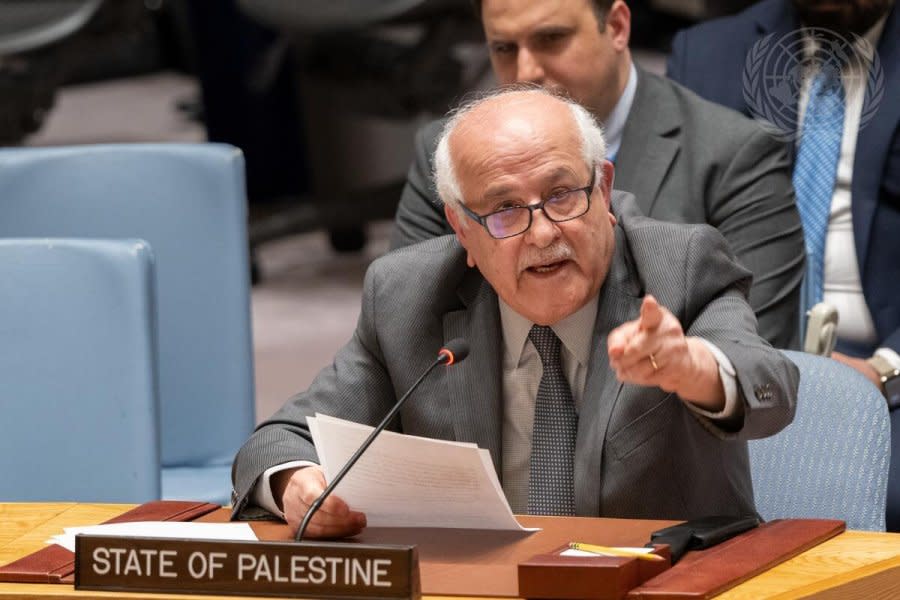U.S. vetoes Palestinian bid for U.N. membership

April 19 (UPI) -- The United States blocked a U.N. Security Council resolution on Thursday to recognize the state of Palestine as a full member state of the United Nations, arguing its acceptance by the intergovernmental body will not equal statehood for the Palestinian people.
The Algeria-submitted resolution received 12 votes in favor, two abstentions from Britain and Switzerland and a vote against by the United States, which is one of five permanent members of the 15-member Security Council with veto power.
The vote prevents the resolution from moving on to the 193-member General Assembly where another round of balloting would have been held on the admission of the state of Palestine, which is one of two non-member observers of the intergovernmental organization, along with the Holy See.
An emotional Riyad Mansour, the Palestinian Authority's ambassador to the United Nations, choked back tears during his remarks following the vote.
"Our right to self-determination has never once been the subject of bargaining or negotiation. Our right to self-determination is a natural right, an historic right, a legal right to live in our homeland, Palestine as an independent state that is free and that is sovereign," he said.
"We we will not disappear. The people of Palestine will not be buried."
The state of Palestine first submitted its request to join the United Nations in 2011, which failed to get off the ground, but worked in the government receiving observer status in November the following year.
Its application was revitalized amid Israel's war against Hamas in Gaza, which began Oct. 7, when the Iran proxy militia launched a brutal surprise attack on the Middle Eastern country, killing 1,200 Israelis with another 253 taken hostage.
The war has put renewed attention on the lack of a Palestinian state, as the death toll of the war in Gaza has ballooned to nearly 34,000 dead, and more than 76,000 injured. Much of the enclave has also been razed by months of bombing, and as of Sunday, some 1.7 million Gazans, or more than 75% of its population, have been displaced, according to the United Nations Palestinian relief agency.
Both the United Nations and the United States back the creation of the two separate independent and sovereign states of Israel and Palestine as the answer to the Israel-Palestinian conflict, and Washington defended its veto Thursday because acceptance into the intergovernmental body will not bring about this two-state solution.
"We also have long been clear that premature actions here in New York, even with the best intentions, will not achieve statehood for the Palestinian people," Robert Wood, U.S. deputy ambassador to the United Nations, said during the meeting.
"It remains the U.S. view that the most expeditious path toward statehood for the Palestinian people is through direct negotiations between Israel and the Palestinian Authority with the support of the United States and other partners."
He pointed out that the report the council received from the admission committee that the members lacked unanimity if the state of Palestine met the criteria for membership under the U.N. Charter.
"We have long called on the Palestinian Authority to undertake necessary reforms to help establish the attributes of readiness for statehood and note that Hamas -- a terrorist organization -- is currently exerting power and influence in Gaza, an integral part of the state envisioned in this resolution," he said.
In Washington, State Department spokesman Vedant Patel further explained that they believe the most expeditious way for the Palestinians to achieve statehood is through negotiations.
He told reporters during the press conference that due to statutory requirements, admission of the State of Palestine would require the United States to cease funding for the United Nations.
"The U.S. is committed to intensifying its engagement on this issue with the Palestinians and the rest of the region, not only to address the current crisis in Gaza but to advance a political settlement here that we think can create a path to Palestinian statehood and membership in the United Nations," he said.
Israel commended the United States for downing the resolution.
"The proposal to recognize a Palestinian state, more than 6 months after the largest massacre of Jews since the Holocaust and after the sexual crimes and other atrocities committed by Hamas terrorists, was a reward for terrorism," Israeli Foreign Affairs Minister Israel Katz said in a statement.
"Terrorism will not be rewarded."

